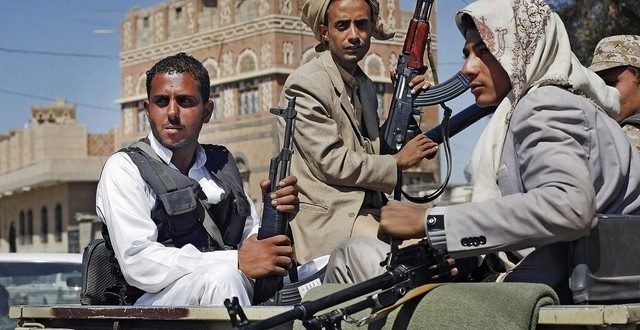Alwaqa Aljadeed – Sana’a: The National
A BBC World News television report, Starving Yemen, has drawn attention to the devastating effects of war on hundreds of thousands of Yemeni children who are suffering from malnutrition and starvation. What it could not explain in its limited airtime was the way in which local communities have a strong capacity to stop famine that is not being utilised.
Over recent months, we have been undertaking research to identify credible ways to provide sustainable and effective relief to Yemen’s beleaguered citizens. This research has been driven by an effort to understand whether techniques used in Syria, where local organising bodies got basic services running, could be effective in avoiding famine in Yemen. Our findings, published late last month, indicate that Yemen’s local councils are ready and capable of taking on such a role. Since the conflict began, local councils have played a key role in mitigating the impact of war. If fully supported by the international community, they could do more to prevent this unfolding disaster.
Councils have helped mediate local ceasefires, navigate armed groups and facilitate the movement of humanitarian supplies across front lines. Understanding the social intricacies of local areas has been an often-overlooked skill that central authorities and international donors largely lack. Yet as the civil war has continued, their funding has dried up and local councils have been found ill-equipped to deliver for their constituents. The vacuum that has opened up has also created space for jihadist groups to step in, threatening any hopes for lasting peace.
Before local councils existed in Yemen, all government functions related to the daily provision of education, health, water and waste collection came from the capital. Political pressure for decentralisation grew following the 1994 civil war between North and South Yemen.
In 2000, a new law sought to neutralise secessionist southern movements, ushering in local elections and decentralising many aspects of central government. However, Ali Abdullah Saleh, the deposed president who is now fighting the government, maintained veto power and continued to appoint the heads of local councils, effectively neutering much of their promised autonomy.
Following the Houthi movement’s military takeover of Sanaa in September 2014 the ability of councils to provide services weakened substantially as their financial funding collapsed. The severity of the crisis has deepened due to expansion of the war and the fall in oil revenue.
International aid has helped to fill some gaps, but the current strategy is insufficient to provide the water, electricity and medicine needed to support the 3 million children under five that require treatment and the millions of other Yemenis that have had their lives disrupted. Our research points to channelling more support through councils.
Locally designed solutions could kick-start local economies so basic markets can function, and maintain the institutional structures that will play the most significant role in post-conflict reconciliation and reconstruction. This assistance can and should be delivered now.
In Syria, where there has been a much greater investment by donors in building systematic responses to the conflict, programmes have been established that fund local councils directly to deliver basic services as a means of alleviating humanitarian crises. Projects have supported farmers to produce food crops in besieged areas and helped establish a low-cost pharmaceutical distribution centre.
Local councils are among the few functioning institutions in Yemen capable of keeping local services running and avoiding suffering reaching unbearable extremes. By not channelling aid more effectively to the local level we are depriving Yemeni society today of the means by which they can stop famine tomorrow.
Andrew Cummings is the Gulf director at Adam Smith International and Maged Al Madhaji is the executive director at the Sanaa Center for Strategic Studies
 الواقع الجديد موقع إخباري منوع مستقل
الواقع الجديد موقع إخباري منوع مستقل

 فريق موقع “الواقع الجديد” يعزي مدير الموقع الاخ محمد عبدالله بوعيران بوفاة والدته
فريق موقع “الواقع الجديد” يعزي مدير الموقع الاخ محمد عبدالله بوعيران بوفاة والدته